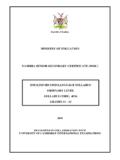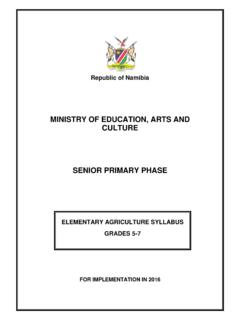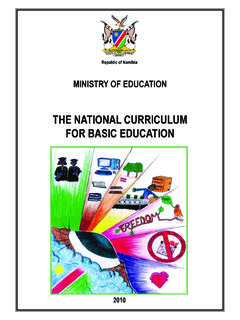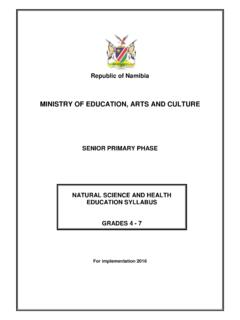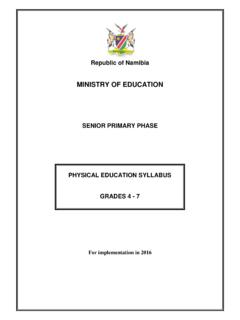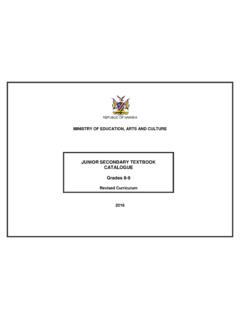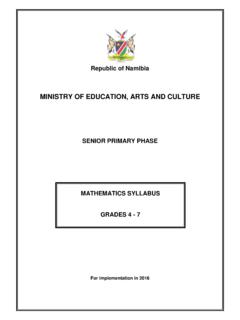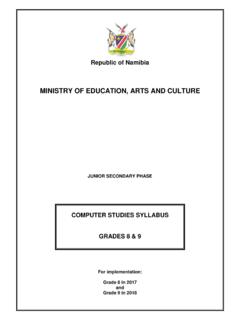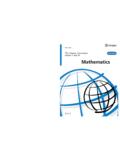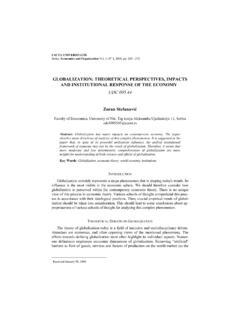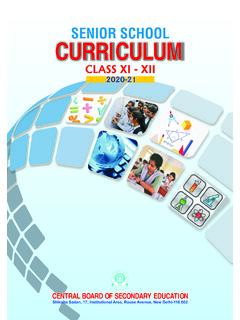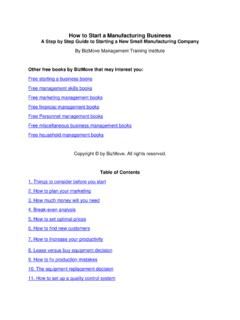Transcription of MINISTRY OF EDUCATION
1 Republic of Namibia MINISTRY OF EDUCATION SENIOR PRIMARY PHASE For implementation in 2016 SOCIAL STUDIES SYLLABUS GRADE 4 - 7 MINISTRY of EDUCATION National Institute for Educational Development (NIED) Private Bag 2034 Okahandja Namibia Copyright NIED, MINISTRY of EDUCATION , 2014 Social Studies Phase Syllabus Grade 4 - 7 ISBN: 978-99945-2-096-1 Printed by NIED Website: Publication date: December 2014 Table of Contents 1. 1 2. Rationale .. 1 3. Aims .. 2 Knowledge and understanding 2 Values and attitudes objectives 2 Skills objectives 2 4.
2 Inclusive EDUCATION .. 3 5. Links to other subjects and cross-curricular Issues .. 3 6. Approach to teaching and learning .. 5 7. End of phase competencies .. 6 8. Summary of the learning content for Grade 4-7 Social Studies .. 8 9. Learning content .. 9 Learning content for Grade4 9 Learning content for Grade5 16 Learning content for Grade6 24 Learning content for Grade7 31 10. Assessment .. 42 Types and methods of assessment 42 Grade descriptors 43 Assessment objectives 44 Continuous assessment: detailed guidelines 44 End of year examinations: detailed guidelines 46 11.
3 Additional Information .. 49 Annexe 1: Terms used in teaching and assessment 49 Annexe 2: Glossary of terms 50 Annexe 3: Assessment record sheet for Grade 4 (Term 1 and 2) 52 Annexe 4: Assessment record sheet for Grade 4 (Term 3) 53 Annexe 5: Assessment record sheet for Grade 5 54 Social Studies syllabus, Grades 4-7, NIED 2014 1 1. Introduction This syllabus describes the intended learning and assessment for Social Studies in the Senior Primary Phase grade 4-7. The aims, learning objectives and competencies, which overlap between subjects, are amongst the essential learning within the curriculum as a whole.
4 Furthermore, the Social Studies Syllabi was developed in a clear and simple style in order to convey the ethos of learner-centred EDUCATION . Learner-centred EDUCATION presupposes that teachers must have a holistic view of the learner, valuing the learner's life experience as the focal point of learning and teaching. Teachers should therefore select learning content and methods on the basis of the learner's needs within their immediate environment and the community. The themes and topics in the Social Studies curriculum embrace content matter in all other subjects across the curriculum.
5 NIED has agreed on a fixed curriculum review cycle. The expected year for the implementation of the next review of the Senior Primary Phase is 2018. Under optimal circumstances, this subject would need six (6) numbers of periods per week in grade 4 and five (5) numbers of periods per week in grade 5 - 7. 2. Rationale Social Studies content integrates History and geography with some Economics and Sociology. The subject is an important place in the primary school curriculum. It lends itself to inculcating in the learners from a very early age a sense of belonging to the community and country: and cultivating the right instincts for reinforcing social cohesion.
6 The Social Studies curriculum aims to enable learners to have a better understanding of their social world. This will help them to participate effectively in the society and the environment in which they live. The aims of the Social Studies Syllabus can be achieved by developing learners in the domains; namely knowledge, skills, values and attitudes. Specific objectives have been identified for each of these domains. Social Studies as an integrated subject helps learners understand the relationships between people and their environments.
7 It deals with the interaction within the social, civic, political, economic, cultural and natural environment. It helps learners to become responsible citizens in their community, country, continent and the world through the development of essential knowledge, understanding, skills and attitudes. With its emphasis on geographical and historical themes, topics, concepts and methods, Social Studies lays the basis for further specialised studies in History, geography and Economics at Secondary level. Social Studies syllabus, Grades 4-7, NIED 2014 2 3.
8 Aims Social Studies promote the following aims in the curriculum: Knowledge and understanding Learners will develop knowledge and understanding of: local, national, sub-regional, African and world history, and shared elements of a culture relationships between people and their physical and cultural environment locally and globally, and how they organise, adapt to and change their environments how people meet basic needs, how they organise their economic activities, and how they are connected to and interdependent in communities, countries, continents, and the world.
9 This study involves the past, present and future. social organisations and social functions, such as family life, religion, civic groups and associations, government, communication and transportation national identity, constitutional guarantees, traditional and modern government, civic values, rights, and responsibilities. the impact of technology and science on human activities and society causes of change and development that influence a peaceful and harmonious life in the family, community, country and the world factors that influence and shape the quality of life of citizens.
10 Values and attitudes objectives Learners will develop informed and responsible values and attitudes towards: the need for co-operation and interdependence among people and among countries. tolerance of other social, cultural and political values and beliefs appreciation of and confidence in oneself commitment to human values such as justice, equality, truth, freedom, diversity, and human rights appreciation of our Constitution and democratic behaviour critical awareness of our society in order to become a truly democratic citizen making responsible judgments in terms of justice, equality and other democratic values commitment (dedication) to sustain a balance between people and their natural environment ( ecological sustainability)
